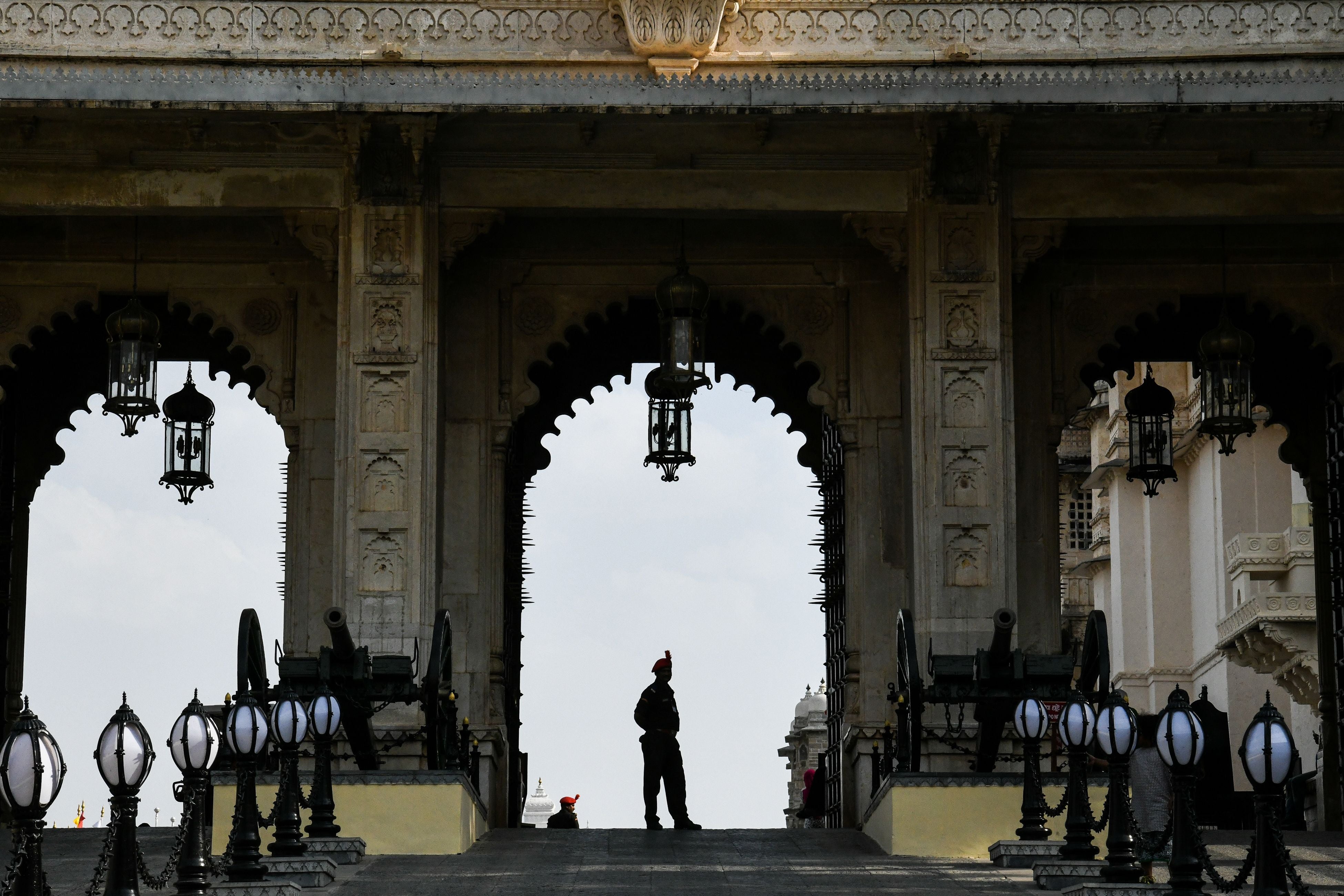Bitter succession row between Indian royals spills over into public eye
Tensions erupt in Udaipur after newly-anointed ceremonial head blocked from entering palace grounds

A 400-year-old palace in northern India became the site of a massive feud between members of an erstwhile royal family that escalated to stone pelting and police intervention.
Earlier this month, Vishvaraj Singh Mewar, a member of the ruling Bharatiya Janata Party (BJP), was anointed as the 77th Maharana of Mewar – a titular head of a region in the northwestern state of Rajasthan in India.
On 25 November, Mr Singh Mewar decided to visit a temple within the Udaipur City Palace grounds to seek blessings on becoming the ceremonial head of the Mewar royal family. But he was issued a notice by the palace trust denying him permission to enter the grounds.
Enraged supporters of Mr Singh Mewar allegedly tried to break down the barricades that had been placed by the palace administration. According to media reports, stones were pelted both by Mr Singh Mewar’s supporters as well as from within the palace leading to the police being forced to intervene to calm the situation.
“The administration and police tried to calm them but they started throwing away the barricades and pelting stones, glass bottles, and bricks,” Udaipur Police superintendent Yogesh Goyal said, according to Hindustan Times. “Several people were injured and rushed to the hospital.”
“The situation that we see today is unfortunate,” Mr Singh Mewar told the media. “I am grateful for your support. On one side are properties, but there are also traditions where we seek blessings. This is wrong as far as traditions and society norms are concerned,” he said.
“It is a years-old ritual of the [erstwhile] royal family that we have to follow, be it legally or socially or ritually. I waited for over five hours at night but yet was denied entry,” he added.
The source of the clash between the palace trust and Mr Singh Mewar lies in a family succession dispute and a will that dates back 40 years to 1984.
Origins of the dispute
Created in 1955 by Maharana Bhupal Singhji of Mewar, the Shri Eklingji Trust takes care of all upkeep and expenses of palaces, temples, and forts that are held by the Mewar family.
In 1984, then head of the royal family, Maharana Bhagwat Singh, left the control of the trust to his younger son Arvind Singh, bypassing his older son Mahendra Singh and cutting him out of the succession entirely after a dispute.
Mahendra Singh’s son is Mr Singh Mewar.
Despite being left out of the will, Mahendra Singh was anointed as the Maharana of Mewar on 19 November 1984 after the death of Bhagwat Singh, a ceremony that was even marked by a grand spectacle.
Arvind Singh, however, contested Mahendra Singh’s claim to the title, asserting that he, according to their father’s will, was the legitimate custodian of the Mewar legacy.
After Mahendra Singh’s death on 10 November this year at 83, Mr Singh Mewar was anointed, following which the palace trust issued a notice that pointed out that Mr Singh Mewar is not a trustee and doesn’t hold any legal title in the trust either, in which case his attempt at entering the palace grounds is “criminal trespass”.
What happens now?
“What happened was unfortunate. We hope that the administration and the government will stand with truth and serve justice,” Lakshyaraj Singh, the son of Arvind Singh told reporters.
“People in political positions should not misuse their position and power within the government to enter our home. People cannot force themselves into our home,” he said.
“We can always approach the court. It is not right to take the law into your hands and consider yourself above the law. We have faced a similar situation 40 years ago, and will reply in terms of law to their illegal approach.
“People, including women and children, could have died had the chaos escalated. I urge everyone to step up according to the law. We all need to be united to find a resolution to this, at least not through hooliganism,” he said.
Mr Singh Mewar has said that in accordance with royal traditions, he only wanted to visit two temples, the Ekling Shiv temple about 50km from Udaipur and the Dhuni Mata temple within the palace grounds – both of which are under the care of the trust, and therefore his uncle, Arvind Singh.
The matter of the succession and who controls the properties belonging to the royal Mewar family has been stuck in courts for decades; a 2020 judgement declared that the disputed property would be divided into four parts: three would be divided between Bhagwat Singh’s three children, Mahendra Singh, Arvind Singh, and Yogeshwari Kumari, and the fourth part would stay under the late Bhagwat Singh’s name. Until the exact division is finalised, the court declared that the three children would be permitted to use the royal properties on a rotational basis for four years each.
While the situation in Udaipur is under control now, according to the police, it is still uncertain as to whether Mr Singh Mewar will be allowed to enter the palace.
India abolished privy purses and the recognition granted to the rulers of Indian states in July 1971. Cut off from the income they made from their estates and the privy purses, many royal families sold jewellery and other assets to maintain their lives, while many have converted their palaces into heritage hotels.
Recently, Albert Hall Museum in Rajasthan’s Jaipur, which houses one of India’s finest collections of royal artefacts, was forced to close for two days after a significant rat infestation.
Join our commenting forum
Join thought-provoking conversations, follow other Independent readers and see their replies
0Comments